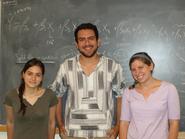
Over the past several decades, psychologists have placed a growing level of importance on bringing up children with high self-esteem, but according to the research of Beril Esen ’13, Susannah Parkin ’13 and Jose Mendez ’14, a person’s level of self-esteem is not always what it appears to be. The three students are furthering the work of Associate Professor of Psychology Jennifer Borton, whose research compares the traditional concept of high self-esteem with the less studied concept of defensive self-esteem.
Defensive self-esteem exists when a person has high explicit self-esteem (their conscious evaluation of themselves) and low implicit self-esteem (their subconscious views of self). People with defensive self-esteem are prone to a variety of negative social behaviors, including aggression, in-group bias and ethnic discrimination. Previous work in Professor Borton’s lab has shown that people with defensive self-esteem focus their attention on cues signaling social rejection, sometimes even to the point of missing important information. The students continued this line of research by examining whether people with defensive self-esteem actively seek out social rejection cues – in other words, whether they are vigilant for such cues in their environment.
The first step of the researchers’ process was to evaluate the self-esteem of study participants. This was done via an online explicit self-esteem survey completed when participants signed up for the study, and a second reaction-time-based implicit self-esteem measure administered during the study. Participants were then directed to complete a vigilance task in which they were shown a series of seven faces with a shared emotion (happy, disgusted or neutral) and one face with a different emotion. The participants were asked to select the face that displayed the different emotion. Based on the students’ hypothesis and Professor Borton’s previous research, participants with defensive self-esteem should more quickly distinguish a disgusted (socially rejecting) face from either neutral or happy faces.
The students analyzed the data and discovered an unexpected gender difference. Although, there was no effect for men or for women with secure self-esteem, women with defensive self-esteem were more vigilant for social rejection faces. Future research may indicate why this gender difference occurs and its implications for social interaction.
The researchers are enthusiastic about the broad implications of defensive self-esteem research. According to Parkin and Mendez, defensive self-esteem does not have a “cure” in the traditional sense, but education and awareness can help to prevent individuals from engaging in subconscious negative self-esteem behaviors. Esen specifically noted the potential role of early childhood teachers in combating defensive self-esteem by minimizing rejection in the classroom, an observation that Parkin supported thanks to her past experience working with autistic children at the New England Center for Children.
Esen is a psychology concentrator with a minor in philosophy. She is spending the second half of her summer researching domestic violence and women’s issues in Istanbul, Turkey, with the assistance of a Levitt Summer Research Grant. Parkin, winner of the 2012 Fillius-Drown Prize Scholarship, is also pursuing a concentration in psychology and has a minor in sociology. Mendez is a psychology concentrator and has minors in French and art.
Esen is a graduate of The Koc School (Turkey), Parkin is a graduate of Arlington High School (Mass.) and Mendez is a graduate of DelCampo International School (Honduras).
